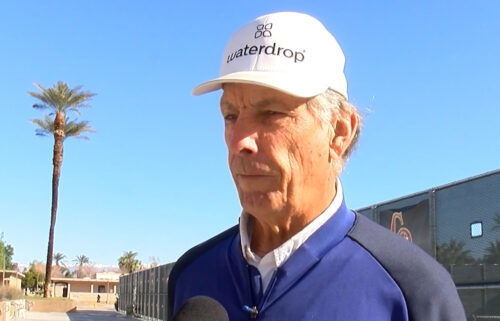A group of California inmates just earned bachelor’s degrees while behind bars

By Alaa Elassar, CNN
A triumphant group of incarcerated students at a prison in California began a new chapter of their lives on Tuesday after graduating with their bachelor’s degrees.
The 25 students, who are incarcerated at California State Prison, Los Angeles County (LAC), celebrated their commencement ceremony in the prison yard, 70 miles away from the campus that made it possible.
The new graduates were members of a program at California State University, Los Angeles (Cal State LA), in partnership with LAC, which allows incarcerated individuals to receive Bachelor of Communication degrees, the university said in a news release Thursday.
“Today, an education to me, means freedom, redemption, and opportunity,” Dara Yin, one of the graduates, said during his speech at the ceremony, according to the release.
“The freedom to create better lives. A redeeming quality in the sense that we can step out of an identity that was destructive and into the person our mothers always meant for us to be. The opportunity to show that we are not our worst decisions,” Yin added.
Cal State LA’s Prison B.A. Graduation Initiative is California’s first in-person bachelor’s program conducted within the prison, according to the university. So far, 37 incarcerated students have graduated from the program, including 12 who had their sentences commuted and have been released.
“Obtaining a higher education in a prison setting through a partner like Cal State LA is an opportunity for incarcerated people to have a true second chance,” California Department of Corrections and Rehabilitation (CDCR) Secretary Kathleen Allison said in the release. “There is no resource more powerful than an education, where people can gain new skills and learn new perspectives.”
Incarcerated students who were released before graduating finished their degrees and graduated on campus. Five of the graduates on the outside are also now completing their Master’s degrees at Cal State LA, according to Taffany Lim, director of the Prison B.A. Graduation Initiative.
“The power of a college education is about more than just receiving a piece of paper. What this bachelor’s degree encapsulates for these men is hope and transformation,” Lim told CNN. “Their accomplishment has a positive ripple effect on the other men in the prison, their friends, families, and communities. And because of this, we believe that a college education is about breaking the cycle of incarceration.”
‘Another chance at life’
Allen Burnett grew up in prison.
For 27 years, violence, drug abuse, suicide, murder and rape surrounded him, constant reminders he would spend the rest of his life behind bars while the world outside his four walls continued as normal.
Burnett was 18 years old when he and two others were involved in a carjacking and another individual shot and killed the victim. Burnett was charged with robbery, kidnapping, and first degree murder and sentenced to life without possibility of parole, he said.
“I didn’t want to tell people my sentence because I hated the way they would respond to me,” Burnett, 48, told CNN. “They would look at me as if to say, ‘Oh, you’re dead. You’re dying’, like I had cancer or something. My life was over. The sense of hopelessness was always there.”
That was until he began studying to earn his bachelor’s degree in 2016 while still in prison through Cal State LA’s Prison B.A. Graduation Initiative.
For five years, his focus became completing course after course, making art work, analyzing literature and writing articles that opened a portal into a world he says he once believed he couldn’t ever be a part of.
“Having professors come into the facility and make space for us has been life changing. They told us things I was never accustomed to hearing, things I never expected to hear, like ‘We believe in you,’ ‘That’s a good job,’ ‘You did this correctly’,” Burnett said.
“I was being affirmed in this space, and so I began buying into the idea that my life was about a lot more than the crimes I committed and the life I had growing up that led to me committing them. It gave me another chance at life.”
Burnett was released in June of 2020 after his sentence was commuted by California Gov. Gavin Newsom.
On the day of his release, Burnett climbed to the top of a cliff overlooking the ocean. He sat with his sister, who was 13 when he was arrested, and realized she aged to look just like their mother. He took quiet drives down the same roads his prison bus would take from one institution to another.
“It took a long time for my freedom to feel real,” he said. “I was a different person. I went from a person who never took responsibility or accountability to a scholar and someone just full of love.”
In July of this year, Burnett got to walk the stage at his graduation ceremony on campus.
“It still is the best thing that ever happened to me,” Burnett said.
Today, Burnett is completing his Master’s degree in communications at Cal State LA while working as a member of Human Rights Watch’s Leadership Council, a nationwide program that campaigns against the practice of sentencing people to life without parole.
‘This is not a luxury, it’s a necessity’
When Kamran Afary watched his students cross the stage to receive their diplomas, he said he couldn’t help but cry.
Afary, a communications studies associate professor at Cal State LA, is one of the 15 professors who teach in-person classes at the prison.
“Emotionally it was a site to behold as I stood watching them walk the stage, tears of joy coming down, with sadness about the loss and hope about a different future,” Afary told CNN.
“I’ve seen them grow tremendously and develop and transform and become articulate advocates and spokespeople and researchers and scholars. I’m very blessed to have the opportunity to work with them.”
Afary has always been an outspoken advocate for incarcerated individuals, many who don’t get opportunities to access an education that could change their lives.
The professor, who teaches interpersonal communication, health communication, and performance and social change, also uses his classes to teach conflict management techniques.
“This is not a luxury, it’s a necessity. We need to change the environment of prisons from a correctional, punishment facility that cages people and isolates them,” Afary said. “We need to move away from all the stigmatizing and dehumanization that happens in prisons, and education is a very important part of that.”
While some argue incarcerated people do not deserve a second chance because of the crimes they committed, Afary says education is the key to create a healing environment both inside and outside prison walls.
“The men who graduated, myself included, are super appreciative of having a second chance at life and coming home, but we understand that we have a great responsibility to the families we devastated,” Burnett said.
“The public should know that. Our education isn’t a free pass to wipe our slates clean. It’s an acknowledgment that we have to change our lives to be accountable, and education is what allows us to do that.”
The-CNN-Wire
™ & © 2021 Cable News Network, Inc., a WarnerMedia Company. All rights reserved.



